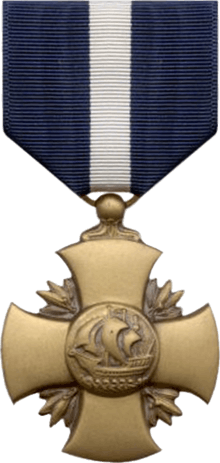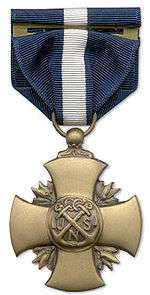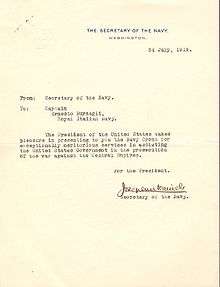Navy Cross
| Navy Cross | |
|---|---|
 | |
| Awarded by United States Department of the Navy | |
| Type | Medal (decoration) |
| Awarded for | Distinguishes himself or herself in action by extraordinary heroism in combat not justifying the Medal of Honor. |
| Status | Currently awarded |
| Statistics | |
| Established | Act of Congress (Public Law 65-253), approved on February 4, 1919. |
| First awarded | 1919 |
| Total awarded | c. 6,900[1] |
| Precedence | |
| Next (higher) | Medal of Honor |
| Equivalent |
Army: Distinguished Service Cross Marine Corps: Navy Cross Air Force: Air Force Cross Coast Guard: Coast Guard Cross |
| Next (lower) | Distinguished Service Medals: Defense, Homeland Security |
 Reverse of the Navy Cross | |
The Navy Cross is the United States military's second-highest decoration awarded for valor in combat. The Navy Cross is awarded primarily to a member of the United States Navy, U.S. Marine Corps, or U.S. Coast Guard (when operating under the Department of the Navy) for extraordinary heroism.[2] The medal is equivalent to the Army's Distinguished Service Cross, the Air Force's Air Force Cross and the Coast Guard's Coast Guard Cross.
The Navy Cross is bestowed by the Secretary of the Navy and may also be awarded to members of the other armed services, and to foreign military personnel while serving with the U.S. naval services. The Navy Cross was established by Act of Congress (Public Law 65-253) and approved on February 4, 1919.
History
The Navy Cross was instituted in part due to the entrance of the United States into World War I. Many European nations had the custom of decorating heroes from other nations, but the Medal of Honor was the sole American award for valor at the time.[3] The Army instituted the Distinguished Service Cross and Distinguished Service Medal in 1918, while the Navy followed suit in 1919, retroactive to 6 April 1917. Originally, the Navy Cross was lower in precedence than the Medal of Honor and the Navy Distinguished Service Medal, because it was awarded for both combat heroism and for "other distinguished service."[3] Congress revised this on 7 August 1942, making the Navy Cross a combat-only decoration that follows the Medal of Honor in order of precedence. Since the medal was established, it has been awarded more than 6,300 times.[3] It was designed by James Earle Fraser.[3]
The first actual recipient of the Navy Cross is unknown because initial awards were made from a lengthy list published after World War I.
Criteria
The Navy Cross may be awarded to any member of the U.S. Armed Forces while serving with the Navy, Marine Corps, or Coast Guard (in time of war only) who distinguishes himself or herself in action by extraordinary heroism not justifying an award of the Medal of Honor. The action must take place under one of three circumstances:
- In combat action while engaged against an enemy of the United States; or,
- In combat action while engaged in military operations involving conflict with an opposing foreign force; or,
- In combat action while serving with friendly foreign forces, who are engaged in armed conflict in which the United States is not a belligerent party.
The act(s) to be commended must be performed in the presence of great danger, or at great personal risk, and must be performed in such a manner as to render the individual's action(s) highly conspicuous among others of equal grade, rate, experience, or position of responsibility. An accumulation of minor acts of heroism does not justify an award of the Navy Cross. As originally authorized, the Navy Cross could be awarded for distinguished non-combat acts, but legislation of 7 August 1942 limited the award to acts of combat heroism.
Wear
The Navy Cross originally was the Navy's third-highest decoration, after the Medal of Honor and the Navy Distinguished Service Medal. On 7 August 1942, Congress revised the order of precedence, placing the Navy Cross above the Distinguished Service Medal in precedence. Since that time, the Navy Cross has been worn after the Medal of Honor and before all other awards.
Additional awards of the Navy Cross are denoted by gold or silver 5⁄16 inch stars affixed to the suspension and service ribbon of the medal. A gold star would be issued for each of the second through fifth awards, to be replaced by a silver star which would indicate a sixth award. To date no one has received more than five awards.
Description and symbolism

- Medal
The earliest version of the Navy Cross (1919–1928) featured a more narrow strip of white, while the so-called "Black Widow" medals awarded from 1941–1942 were notable for the dark color due to over-anodized finish. The medal is similar in appearance to the British Distinguished Service Cross.[3]
Obverse: The medal is a modified cross pattée one and a half inches wide. The ends of its arms are rounded whereas a conventional cross patée has arms that are straight on the end. There are four laurel leaves with berries in each of the re-entrant arms of the cross. In the center of the cross a sailing vessel is depicted on waves, sailing to the viewer's left. The vessel is a symbolic caravel of the type used between 1480 and 1500. Fraser selected the caravel because it was a symbol often used by the Naval Academy and because it represented both naval service and the tradition of the sea. The laurel leaves with berries refer to achievement.
Reverse: In the center of the medal, a bronze cross pattée, one and a half inches wide, are crossed anchors from the pre-1850 period, with cables attached. The letters USN are evident amid the anchors.
- Service Ribbon
![]()
The service ribbon is navy blue with a center stripe of white identical to the suspension ribbon of the medal. The blue alludes to naval service; the white represents the purity of selflessness.
Notable recipients
United States Navy
- James Thomas Alexander, Captain, 37th Naval Governor of Guam
- Adelbert Althouse, 27th and 29th Naval Governor of Guam
- Barry K. Atkins
- William B. Ault
- Bernard L. Austin, Vice admiral (two awards)
- John Arnold Austin, namesake of USS Austin (DE-15)
- Matthew Axelson
- Edward L. Beach Jr.
- John "Jack" "Doc" Bradley
- Phil H. Bucklew (two awards)
- John D. Bulkeley (plus MOH and 2 Army DSCs)
- Richard E. Byrd (plus MOH)
- Charles P. Cecil (two awards), namesake of USS Charles P. Cecil (DD-835)
- Gordon Pai'ea Chung-Hoon
- Bernard A. Clarey (three awards)
- George Thomas Coker
- Walter W. Coolbaugh, namesake of USS Coolbaugh (DE-217)
- William P. Cronan, 19th Naval Governor of Guam
- William Michael Crose, 7th Governor of American Samoa
- Randy "Duke" Cunningham
- Winfield Scott Cunningham
- Slade Cutter (four awards)
- Roy M. Davenport (5 awards, World War II)
- Albert David (two awards, plus MOH)
- Arthur C. Davis, Admiral (three awards)
- Samuel David Dealey (4 awards and Army DSC and MOH)
- Dieter Dengler
- Danny Dietz
- Glynn R. "Donc" Donaho (four awards)
- Mark L. Donald, Navy SEAL, medical officer
- William P. Driscoll
- Thomas M. Dykers, Rear admiral (two awards) and lead on the Silent Service TV series.
- Joseph F. Enright
- William Charles Fitzgerald namesake of USS Fitzgerald (DDG-62)
- Eugene B. Fluckey (4 awards and MOH)
- Luis Fonseca, Hospital corpsman
- James Shepherd Freeman
- William Gilmer, 22nd and 24th Naval Governor of Guam
- Robert Halperin
- William Halsey, Jr.
- Robert W. Hayler (three awards), namesake of USS Hayler (DD-997)
- Arthur Ray Hawkins (three awards)
- Lenah H. Sutcliffe Higbee (first female recipient), namesake of USS Higbee (DD-806)[4]
- William A. Hodgman, 23rd Naval Governor of Guam
- John Howard Hoover
- John Howard
- Draper Kauffman (two awards)
- Joseph P. Kennedy, Jr.
- Ernest J. King
- Thomas B. Klakring (three awards)
- Edmond Konrad (two awards)
- George Landenberger, 23rd Governor of American Samoa
- John H. Lang
- Gatewood Lincoln, 22nd Governor of American Samoa
- Elliott Loughlin (two awards)
- Marcus Luttrell
- Harold John Mack
- David McCampbell (plus MOH)
- Benjamin McCandlish, Commodore, 36th Naval Governor of Guam.[5]
- Pete McCloskey
- Donald L. McFaul[6]
- Luke McNamee, Admiral, 10th and 12th Naval Governor of Guam, and 21st Director of the Office of Naval Intelligence.[7]
- Doris "Dorie" Miller (first African American recipient)
- Marc Mitscher (two awards)
- John Anderson Moore (three awards)
- Dudley W. "Mush" Morton (four awards)
- Edward "Butch" O'Hare (plus MOH)
- Richard H. "Dick" O'Kane (three awards, plus MOH)
- Chick Parsons (two awards)
- Edwin Taylor Pollock
- John Martin Poyer, 12th Governor of American Samoa
- Lawson P. Ramage (two awards plus MOH)
- George S. Rentz
- Samuel B. Roberts
- Dean Rockwell
- Maurice H. Rindskopf
- Tony F. Schneider (two awards)[8]
- Benedict J. Semmes, Jr., Vice Admiral[9]
- Rodger W. Simpson (two awards)
- Raymond A. Spruance
- Giles C. Stedman
- George L. Street, III (plus MOH)
- Robert J. Thomas[10]
- Corydon M. Wassell
- Ivan Wettengel, 25th Naval Governor of Guam
- James E. Williams, plus MOH and 2 Silver Stars
- Adam Williams (actor, awarded as Adam William Berg)
United States Marine Corps
- Robert H. Barrow (plus an Army DSC)
- John Basilone (plus MOH)[11]
- Gregory "Pappy" Boyington (plus MOH)
- Marion Eugene Carl (two awards)
- George R. Christmas
- Daniel Daly (plus two awards MOH, and an Army DSC)
- Ray Davis (plus MOH)
- James Devereux
- William A. Eddy
- Merritt A. Edson (two awards plus MOH)
- Raymond Frybarger, Jr. Namesake of the USS Frybarger
- Guy Gabaldon
- Herman H. Hanneken (two awards plus MOH)
- Henry L. Hulbert (plus MOH, and an Army DSC)
- Bradley Kasal
- Treddy Ketcham
- Henry Louis Larsen (two awards)
- Kurt Chew-Een Lee
- Justin LeHew
- William K. MacNulty
- Victor Maghakian
- William Edward Campbell March
- Karl Marlantes
- John McNulty (U.S. Marine Corps) (plus an Army DSC)
- Raymond Murray (two awards plus an Army DSC)
- Peter J. Ortiz (two awards)
- Lewis "Chesty" Puller, US Marine Corps (5 awards and Army DSC)
- Paul A. Putnam
- Ford O. Rogers
- James Roosevelt
- Kenneth L. Reusser (two awards)
- John Ripley
- William H. Rupertus
- Al Schmid
- Harry Schmidt
- Harold G. Schrier (flag raiser on Iwo Jima)
- Lemuel C. Shepherd, Jr.
- Robert Taplett
- Alexander Vandegrift (plus MOH)
- Lew Walt (two awards)
- Jim Webb
United States Army
United States Coast Guard
Non-citizen recipients

The Secretary of the Navy has only occasional opportunities to confirm that the Navy Cross has been awarded to a non-American recipient. Slightly more than 100 such honors have been extended to men who were not citizens of the United States.
- Gordon Bridson, New Zealand (1943)[15] [16]
- Ernesto Burzagli, Italy (1919)
- Harold Farncomb, Australia (1945)[17]
- Israel Fisanovich, Soviet Union (1944), Soviet Navy submarine commander[18]
- Émile Henry Muselier, France (1919)[19]
- Peter Phipps, New Zealand (1943)[20][16]
- Ronald Niel Stuart, first Royal Navy officer to receive both the American Navy Cross and the British Victoria Cross[21]
- Tran Van Bay, South Vietnam (1967), posthumous
- Nguyen Van Kiet, South Vietnam (1972)
- Mikhail Vasilyevich Greshilov, (Михаи́л Васи́льевич Греши́лов), Soviet Union (1944), Soviet Navy submarine commander[22]
See also
Notes
- ↑ Recipients of the Navy Cross
- ↑ SECNAVYINST 2006, 1650.1H, P. 2--22&23
- 1 2 3 4 5 "The Navy Cross". Naval Historical Center. January 24, 2001. Retrieved August 12, 2009.
- ↑ "Chief Nurse Lenah H. Sutcliffe Higbee, U.S. Navy".
- ↑ "Benjamin Vaughan McCandlish". Military Times. Gannett Government Media. 2011. Archived from the original on May 18, 2011. Retrieved May 18, 2011.
- ↑ "Valor awards for Donald L. McFaul | Military Times Hall of Valor". Militarytimes.com. 2010-07-04. Retrieved 2012-10-31.
- ↑ "Admiral M'Namee Dead in Newport: Former Head of Mackay Radio, Adviser at 1919 Paris Peace Parley, in Navy 42 Years". The New York Times. New York City. The New York Times Company. 31 December 1952. p. 15. Retrieved 12 August 2013.
- ↑ University of New Mexico NROTC Sun Line Vol.IV No.1 November 1965
- ↑ TogetherWeServed - VADM Benedict Semmes
- ↑ "Valor awards for Robert J. Thomas | Military Times Hall of Valor". Militarytimes.com. 2010-07-04. Retrieved 2012-10-31.
- ↑ http://web.archive.org/web/20080616211621/http://www.history.army.mil/html/moh/wwII-a-f.html
- ↑ United States Coast Guard: Rear Admiral Frederick C. Billard
- 1 2 Larzelere, pp 178–179
- ↑ United States Coast Guard: Commander Elmer Fowler Stone biography
- ↑ Dictionary of New Zealand Biography: Bridson bio notes
- 1 2 Dear, pp 46–47
- ↑ Australian Dictionary of Biography: Farncomb bio notes
- ↑ Heroes of the Soviet Union (in Russian language, same data in English)
- ↑ Hallett, Frederick H. "The Loss of Surcouf: Solving an Old Mystery". The Submarine Review. Annandale, Virginia: The Naval Submarine League (Winter 2012): 72.
- ↑ Royal New Zealand Navy: Phipps bio notes
- ↑ Snelling, Stephen. (2002). The Naval VCs, p. 142.
- ↑ "M. V. G. Greshilove (sic)". Military Times. Retrieved 2014-06-08.
References
- "Navy Cross". Service Medals and Campaign Credits of the United States. United States Navy. Retrieved July 10, 2007.
- Dear, Murray (April 2015). "A Weekend's Leave in Auckland". Naval History. Annapolis, Maryland: U.S. Naval Institute. 29 (2): 46–47.
- Larzelere, Alex (2003). The Coast Guard in World War I: An Untold Story. Naval Institute Press, Annapolis, Maryland. ISBN 978-1-55750-476-0.
External links
| Wikimedia Commons has media related to Navy Cross. |